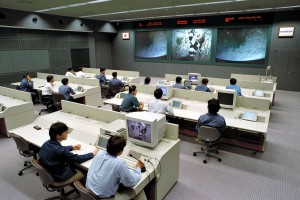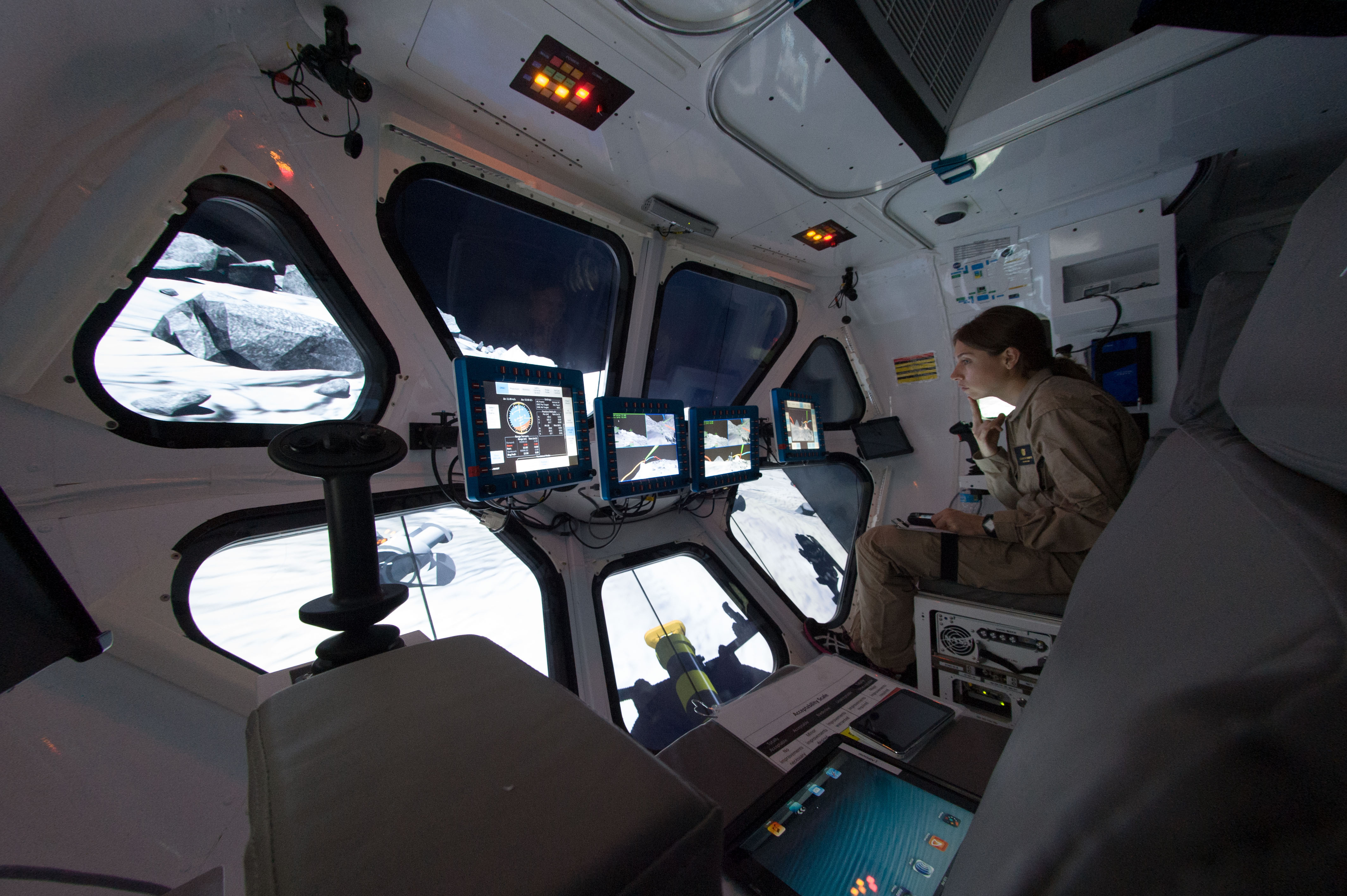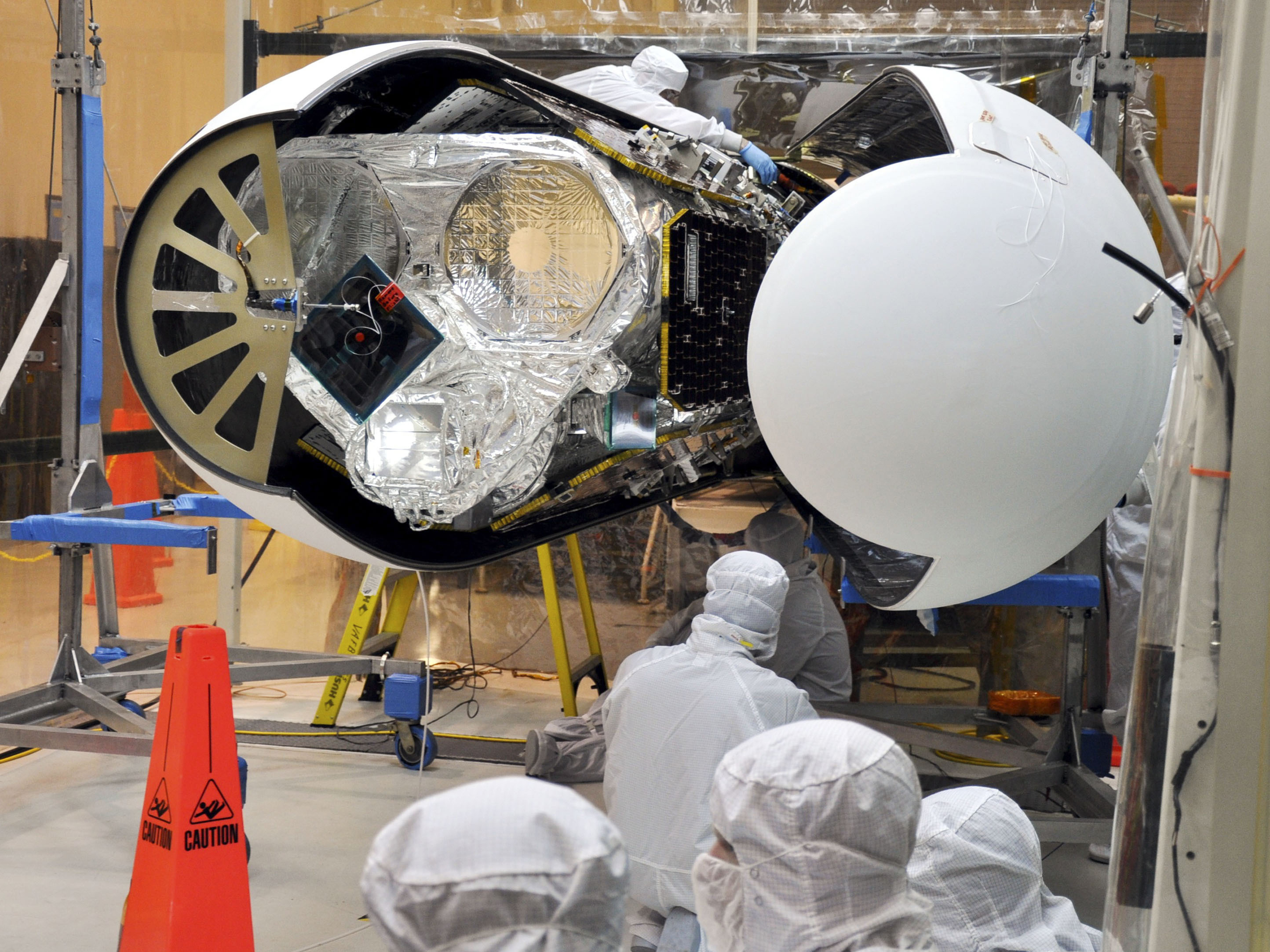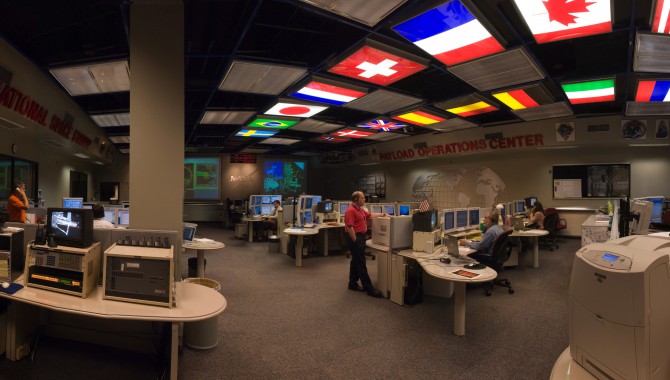
By Angela Marsh
At the Marshall Space Flight Center Mission Operations Laboratory, we provide facilities, systems, and ground-systems services to other NASA centers, universities, and research centers and to international space agencies.
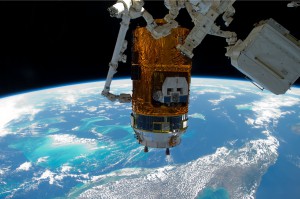
In the grasp of the International Space Station’s Canadarm-2, JAXA’s Kounotori-2 H-II Transfer Vehicle is moved from the space-facing side of the Harmony node back to the Earth-facing port of Harmony.
Photo Credit: NASA
International Space Station (ISS) payload operations are among the services we offer at our control center. The payload operations include command and control of science payloads aboard the ISS and communicating data from the experiments to organizations in the United States and to our international partners.
As mission operations systems manager and co-chair of the ISS Ground-Segment Control Board, I’ve become aware of some of the challenges and subtleties of working successfully with our colleagues at the European Space Agency (ESA), the Japan Aerospace Exploration Agency (JAXA), the Canadian Space Agency, and the Russian Federal Space Agency. I took the Academy of Program/Project and Engineering Leadership’s International Project Management (IPM) course in February 2012 in hopes of getting some tools and insights that would help us ensure that those international partnerships are as productive and effective as possible.
Crisis Response
Normal ISS payload operations are complex to begin with. An unforeseen crisis adds to the complexity, and not having a good understanding of how international partners operate can make a difficult situation even harder to evaluate and manage. Around midnight on March 10, 2011—the morning of March 11 in Japan—our Huntsville Operations Support Center ground controller received a call from the ground controller at the Space Station Integration and Promotion Center (SSIPC), which monitors and commands Kibo, the Japanese experiment module, at JAXA’s Tsukuba Space Center. Our log reports that the Japanese controller sounded “scared” as he relayed the news that the trans-Pacific circuit was down.
The source of the problem, of course, was the undersea earthquake and tsunami that caused such devastation in Japan. The ground systems for Kibo and Japan’s H-II Transfer Vehicle (HTV) were damaged, and circuits between SSIPC and Johnson Space Center were lost. But the link between SSIPC and Marshall remained intact.
Nevertheless, we did not hear from JAXA for two full days after that log entry. The IPM course brought clarity to what was happening during that time. In a situation like the tsunami, people are worried and confused about what to do. Knowing the level of management decision required by the Japanese, those days were surely spent getting required approvals from line management for forward plans. After the course, I could have better explained to our ground controllers what was happening and told them not to worry as much—that JAXA was taking care of business the way they needed to and we would hear from them when decisions were approved.
Almost a year later, the IPM course identified the likely primary cause of that silence. In Cultures and Organizations, the main text for the course, Geert Hofstede discussed the relationship between bosses and subordinates and the process of making decisions in Japanese organizations. Those two days were almost certainly spent in methodical and detailed work and team reliance on leaders to make final decisions for the group.
On March 13th, the decision was made, and our Japanese colleagues requested a change in voice formats. On the 14th, voice was re-routed through Marshall. That remained the active link until the Johnson circuit was recovered on March 18th.

The International Space Station Payload Operations Center at Marshall Space Flight Center.
Photo Credit: NASA/Marshall Space Flight Center
Learning About Our Partners
The IPM course covers cultural challenges, legal concerns, and teaming issues likely to be encountered when working with international partners. Some of the material is very straightforward. Things like being aware of time differences and foreign holidays when scheduling meetings and setting deadlines are simple but important, both as practical issues and as signs of respect and consideration.
There are many additional ways to show respect and begin to develop the trust that is essential to working well together, from learning greetings and common phrases in partners’ native languages to trying local food and drink to subtler social issues like the meaning of particular gestures or ways of speaking in a given culture.
A lot of these elements are discussed in Hofstede’s book. He explains how the cultural characteristics of various countries are likely to play out in business transactions and suggests the kinds of adjustments in communications, negotiating styles, and expectations that need to be made in various international work situations. Speakers at the course supplement his advice with information specific to international cooperation in space—for instance, how different space agencies manage their projects, and the influence of trade regulations on sharing aerospace technologies.
As useful as the information provided by readings and presentations is, the most valuable part of the course may be the opportunity it provides to meet and work with the foreign nationals who are taking it. Interacting with them informally and in class activities that involve playing out a multicultural project together bring the cultural issues to life and make our differences—and our similarities—vividly real. It also helps bring language issues to light.
English is the official language of the ISS, so our international partners are working in what for them is a foreign language. Helping out with translation and taking time to make sure that everyone has a common understanding of the subject under discussion are essential to avoiding problems. Remaining aware that our international colleagues are not native English speakers also contributes to our appreciation and admiration—they speak English so much better than most of us at NASA can speak any other language.
Things like being aware of time differences and foreign holidays when scheduling meetings and setting deadlines are simple but important, both as practical issues and as signs of respect and consideration.
Bringing the Lessons Home
The IPM experience gave me the ability and courage to be a better mentor to my team and coworkers, making me more confident that I could give them useful guidance about working with different cultures and countries.
Sensitivity to cultural and organizational differences is essential to the success of all our ISS work with our partners. For example, the alpha magnetic spectrometer Asia Payload Operations Center in Taiwan will be responsible for the safe operation of the spectrometer for the next ten years. A high-level university professor who will lead some of that instrument’s cosmic-ray research mentioned that he would like to visit or send someone to visit Marshall and the Huntsville Operations Support Center. This would give each of us insight into how the other works.
Business invitations between organizations in the United States require an understanding of business etiquette. Business invitations between a U.S. organization and a foreign agency involve additional layers of understanding and finesse. Thanks in part to the IPM course, I was aware of the importance of some of the details of this situation: whom the invitation should be addressed to, who should send it, what the expectations of the visit should be.
Another example: I recently received an e-mail from one of our international partners informing me that he had received an e-mail from Marshall security officials requesting information about their control center assets. Of course, it didn’t take participation in the IPM course for me to know that this was an error that had the potential to upset our partners. But the course did help me understand how important correcting it forcefully and quickly would be to maintaining our relationship of trust and cooperation. I immediately sent an e-mail to our partner, with copies to our other partner centers, explaining that he was not required to send that information and thanking him for bringing the request to my attention.
A more far-reaching security issue relates to compliance with Homeland Security Presidential Directive 12, a mandate that requires government agencies to know who is accessing government systems and whether they can be trusted not to compromise them. Our ISS international partners had a hard time understanding and accepting the idea that the U.S. government would not recognize their own governments’ security credentials.
The IPM course taught that trust is the bottom line of the relationships with our international partners and here we were basically telling them we didn’t trust their security processes and would require them to re-establish their identity using NASA credentials. Not wanting to compromise our relationships yet needing to comply with the security regulation, we decided to redesign our Huntsville Operations Support Center systems to authenticate foreign national users using their NASA user identities and RSA-token identification credentials. This approach still meant we had to convince our partners to load a user-identity verification system at their centers, but it would require no further effort on their part.
Convincing the international community that their systems would not be affected by the additional software took many hours of design review, consultation, and training (and a promise that there would be no cost to the partners)—and it required the trust we were working to preserve. ESA especially and understandably took exception to NASA’s unwillingness to accept their identity and credential system, and it took all our relationship skills to win them over.
In the end, we gained access to our IT systems for the 365 foreign nationals we work with. Putting ourselves in their shoes and making the extra effort to design a system that would have as little impact on them as possible helped maintain the cooperative, trusting relations we have worked so hard to create.
As useful as the information provided by readings and presentations is, the most valuable part of the course may be the opportunity it provides to meet and work with the foreign nationals who are taking it.
Trust and Respect
As these examples suggest, trust and respect are key to successful international partnerships. That is the underlying lesson of the IPM course and of our experience working with our international ISS partners. The reliable service and support we have provided over the years have gained and kept our partners’ trust and built a high level of mutual respect.
We continue to receive regular requests for new system designs and services. ESA has recently requested a new ISS delay-tolerant network. JAXA has asked us to provide Ku-band access to their ISS Japanese Experiment Module laboratory. Years ago, it would have been hard to carry out this request. The language barrier would have been part of the difficulty but so would the formality of documentation they required and the complexity of their management decision process. Over time, though, working together has become significantly easier as trust has developed among the personnel at each center. Sometimes decisions are made at a lower level than would have been possible in the past and with less need for extensive formal assurances. This progress makes us smile because we know we are being successful at a different level, an international level.
Related Links
- APPEL’s International Project Management Course
- ISS Payload Operations Center Fact Sheet
About the Author
 |
Angela Marsh serves as branch chief for the Marshall Space Flight Center Mission Operations Laboratory Mission Operations Systems Branch, managing day-to-day operations of the Huntsville Operations Support Center, which includes the ISS Payload Operations Center and the Fast Affordable Science and Technology Satellite Control Center. She also serves as the deputy chairman for the ISS Ground-Segment Control Board. |






